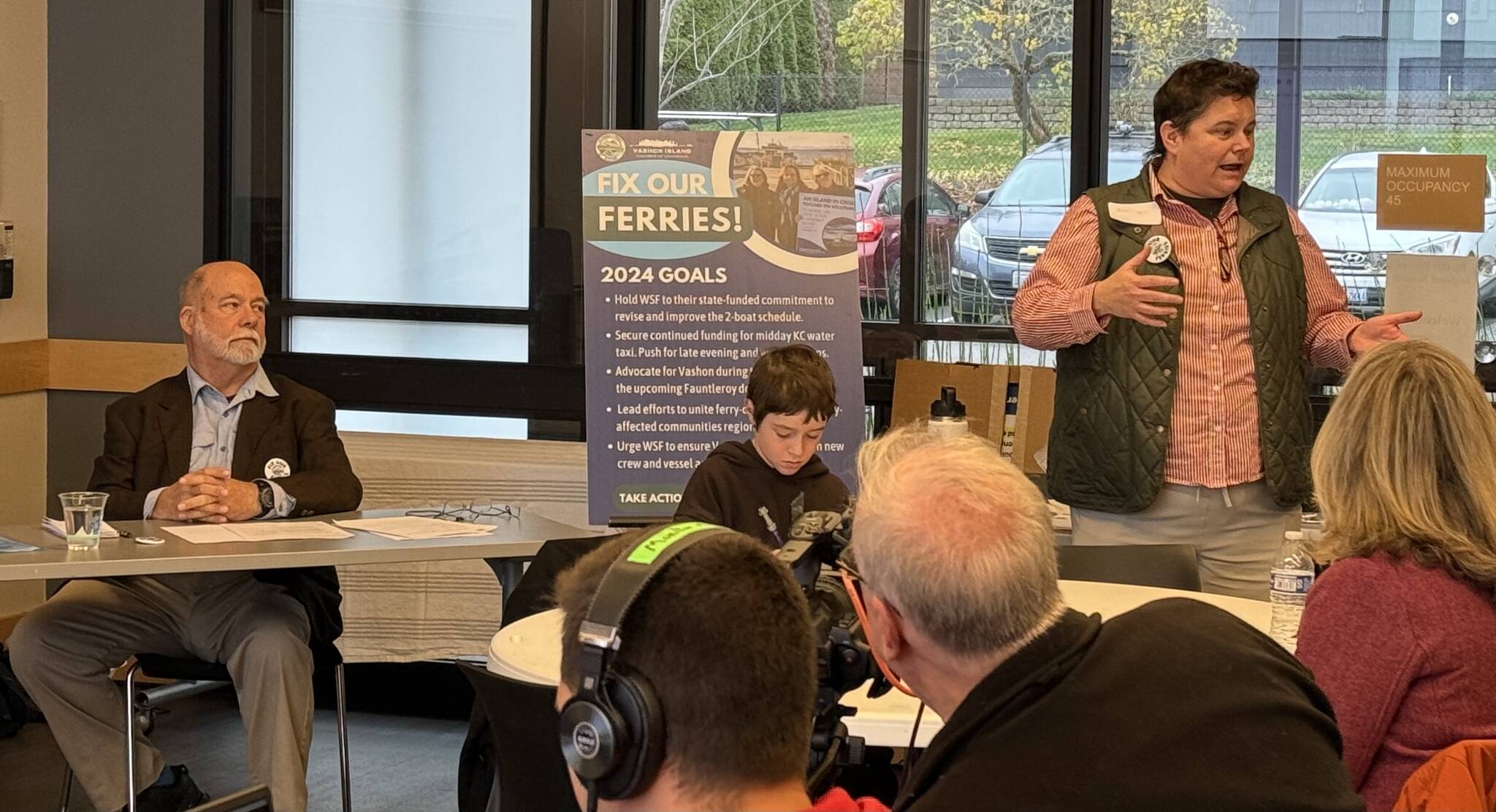Islanders for Ferry Action (IFA) pulled together a Puget Sound problem-solving session during a regionwide ferry community summit on Saturday, Nov. 16.
It was a day of intense dialog that developed dozens of potential solutions to the ferry crisis and solidified action plans for the crucial legislative session coming up in January.
The Vashon Chamber of Commerce formed IFA a year ago to push for state funding for increased runs of the King County Water Taxi, as well as to plan for ways to iron out major gaps in the triangle route two-boat schedule.
IFA was one of many groups at the summit this month, convened in Mukilteo, home to the ferry terminal that serves Whidbey Island. Mukilteo is also home of the chair of the state Senate Transportation Committee, Marko Liias. The thirty-plus participants included legislators such as Liias; citizen ferry activists; city, county, and local agency leaders; Ferry Advisory Committee members; chambers of commerce staff; tourism agencies and other stakeholders.
United under the banner “Fix Our Ferries,” the groups worked to find common ferry issues across their communities and discover solutions and strategies to address those issues.
From the San Juan Islands to Bremerton, Southworth, and Vashon, ferry passengers are experiencing a crisis that continues to wreak havoc on their economic health and quality of life.
“Patients still miss critical medical treatments and ambulances are delayed on hospital runs,” said Rick Wallace, an IFA Steering Committee member. “Children, students, and the elderly are still stranded. Residents still lose wages and jobs. Businesses still lose employees and vital income. Island economies and the State of Washington still lose tourist dollars. Our communities are sinking under this burden. We cannot wait another four years for relief. We need alternative solutions and action now.”
Wallace moderated a panel discussion of legislators, a dialogue that recognized past disinvestments in the state transportation system as a whole — leaving bridges with structural damage, highways with potholes, and medians filled with trash. The ferry system, serving as the state’s marine highway, has suffered a similar fate, speakers said.
“We haven’t kept up with fleet maintenance and readiness,” said Senator Liias. “Not only do we need to take better care of boats we do have, but we need to try to bring new boats online faster to get relief for your communities.”
He welcomed ideas from participants and cited examples like the Kitsap Fast Ferry, which has helped move people to work, appointments, and school, while Washington State Ferries struggles with system-wide delays.
At the same time, Vashon’s state representative Emily Alvarado (D-34) acknowledged the discrepancy between Washington State Ferries’ own reporting about their performance, including on-time sailings, and how service disruptions are being felt by ferry users.
One solution Liias and Alvarado agreed on is the need to recruit more workers. Lawmakers are looking for ways to expand career and technical education opportunities to bring a new generation of workers to serve in the maritime industry.
In the meantime, legislators said they appreciate Islanders for Ferry Action’s “Don’t Squawk on the Dock!” social campaign to protect frontline workers from bearing the brunt of frustrations by ferry riders about late and canceled sailings and other service disruptions — verbal abuse which makes it even more difficult to attract and retain crew.
One bright spot identified by summit attendees: a new Governor about to take office who spent time on the campaign trail talking about ferries and visiting ferry-dependent communities. Legislators and advocates alike hope that governor-elect Bob Ferguson will bring accountability, new ideas, and additional funding to Washington State Ferries.
In the afternoon session, Peter Phillips, a maritime industry consultant and publisher from Burien, delivered a keynote address about the possibilities for the future of marine highways.
Phillips envisioned the return of a mosquito fleet approach, reimagined for today’s commuter. He posited that today’s car ferry mass transit design was developed for moving large volumes of people during set hours. But today’s transportation users behave differently, and the aquatic systems used to move them no longer meet current needs, he said. Philips believes that smaller boats, less expensive to build and maintain and able to serve any marina in Puget Sound, could be a more agile, climate-conscious, and economically efficient choice. The technology for electric boats is already being developed and deployed in European waters and could easily be certified for U.S. service, he said.
Energized by the potential of calling for meaningful solutions with a bigger voice, advocates ended the day with a pledge to organize two lobbying days in Olympia during the legislative session. They plan to advocate for increased accountability, reform, and additional appropriations. Representative Greg Nance, a junior legislator from Bremerton, offered to host the Fix Our Ferries coalition visits to the capitol.
The group intends to continue to collaborate to get shorter-term relief for the millions of ferry riders and communities around Puget Sound while new boats and Coast Guard-certified crew join the system to restore the languishing fleet.
Anyone interested in watching the legislative panels and keynote can do so by visiting tinyurl.com/FixOurFerriesSummit.
Beth Lindsay is an islander who serves on the volunteer steering committee of Islanders for Ferry Action.



